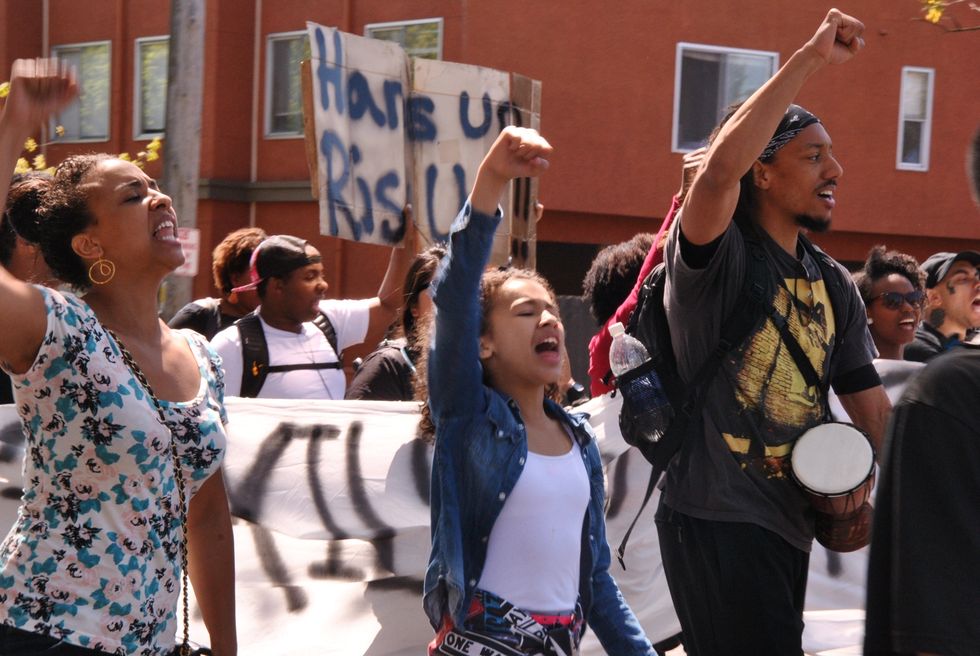“The psychological identification with or vicarious experiencing of the feelings, thoughts, or attitudes of another.” Empathy. For some such as myself, it is a gift you are born with. The ability to put yourself in someone else’s shoes and attempt to understand how or why they’re feeling the way they are. For others, it may not be a natural trait gifted to them, but a vital one needed for various forms of human connection.
A lot of the time empathy is paired with the desire to help heal the hurt that someone is feeling, either by saying the right thing or lending a shoulder to cry on. There are moments where listening alone is enough to alleviate the person’s stress and discontent.
My days are spent thinking about the current racial climate of our nation. Pondering how we got here, brainstorming how to fix the present, and praying for our future. I think of “what’s missing?” and “why aren’t people getting it?” I listen to my black peers and elders with the intention of learning from them and understand their heart. Sadly this is a key component missing from a lot of my white counterparts. There is no listening. There is no empathy. I’ve come to realize that my peers and I are the future and if no one is listening to how we’re feeling now, we will only be as misguided as nation as we are now, 20 years from now.
I had the privilege of getting some of peers to open up about what it means to them to be black in 2018. Listen to the kids. This is what they have to say:
1. What’s your favorite part about being African American?
“Being a part of a race that has a history of strength and resilience even in the most difficult times throughout our history.” -A.M
“Being different. Even though I don’t like how some people think less of me, I like proving them wrong.” -K.B
2. What’s something you have struggled/currently struggle with being African American?
“That maybe my Black is too black sometimes so I find myself correcting myself a lot. I struggled the moment I got passed up for a position that I was more than qualified for only to wake up and notice that I worked in a predominantly white filled job.” -R.A.
“ I feel like I have struggled with fitting in within the african american community. Due to going to a predominantly white elementary/middle school, I was never exposed to my culture until mid-high school.” -N.W
3. If you had the opportunity to say something to all of America concerning our current racial climate, what would it be?
“ I would tell America to just listen to people of color for longer and with intent to try to understand rather than just for the sake of having an argument.“ -A.M
“Being African American doesn’t make me any less of a person than someone that isn’t African American”-K.B
4. Who inspires you in your daily journey as an African American to carry on?
“Oprah Winfrey. A Queen. She started from the bottom and she IS the top. A goal. Success, generosity, gracefulness , she’s the whole package” -J.W
“This is cliche but Beyoncé is one of my top role models. During her 2014 VMA performance of the song Flawless, she used a billboard of the word 'feminist'. I searched the meaning of this word and started educating myself on what being a black woman in America exactly means” -N.W
5. Was there anything you were ever mocked about that’s a specific African American trait? How did that impact how you view yourself?
“Complexion, I guess. A lot of people think I’m mixed but both of my parents are African Americans. I’ve always been super comfortable with who I am, so what people have said has never really bothered me.” -J.W
“... I’m also of Haitian descent. Kids would make fun of my culture. The thing is, I was being mocked by my fellow African Americans. Only to realize after years, that I live in a system that teaches us to hate ourselves.” R.A
6. What’s one message you’d give to all African American youth in the nation to motivate them during a time period where race is still very rocky?
“Id say choose love....I think that's the whole point of life...even beyond the issues of race. Yes I know first hand that dealing with race issues can be challenging but for every situation we have to make a conscious choice to either rise up or do what everyone else is doing...so id say love is the rawest form of protest and resistance there is.” H.B
Complete liberation can not come from the blood and sweat of the oppressed. Complete liberation comes when those who are free use their privilege to help those that are disadvantaged. This comes from empathizing. This comes from listening. Listen to the kids, we’re speaking loud and clear.





 StableDiffusion
StableDiffusion StableDiffusion
StableDiffusion StableDiffusion
StableDiffusion Photo by
Photo by  Photo by
Photo by  Photo by
Photo by 
 Photo by
Photo by  Photo by
Photo by  Photo by
Photo by  Photo by
Photo by  Photo by
Photo by 










